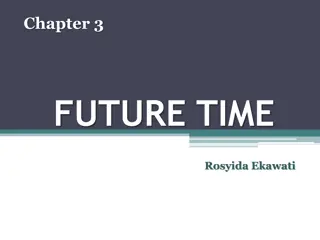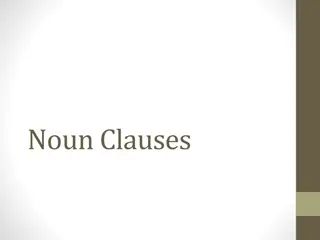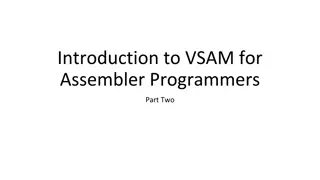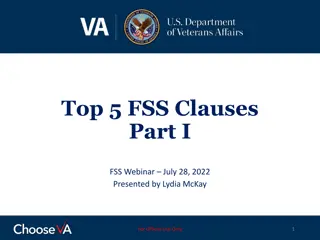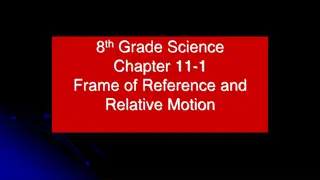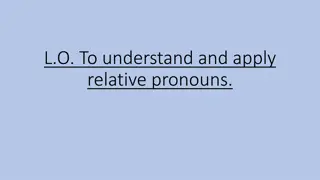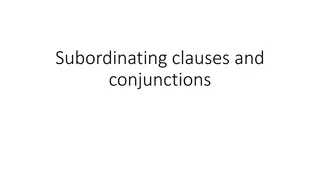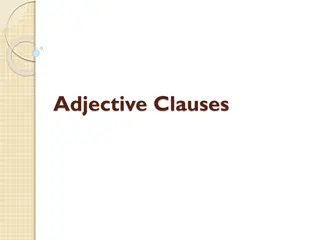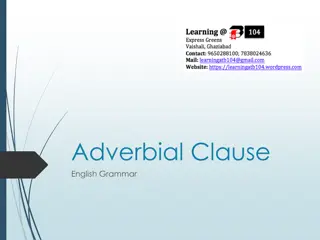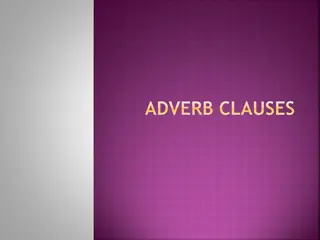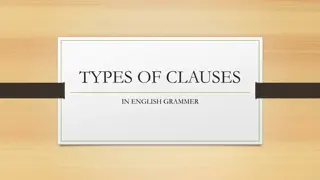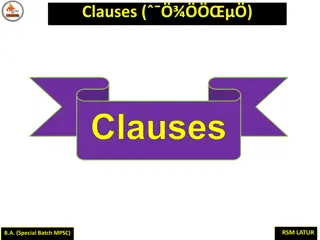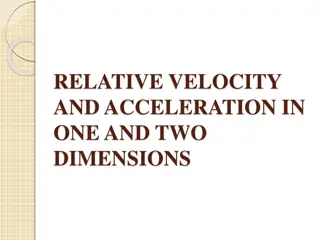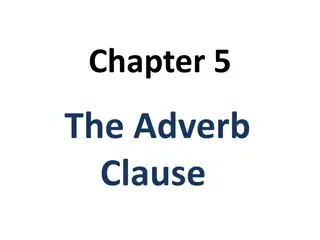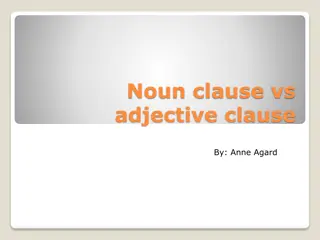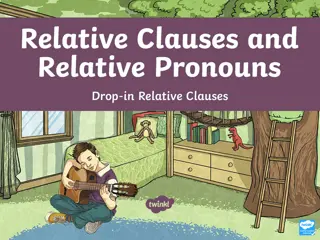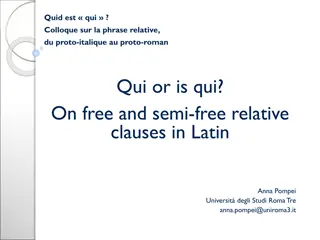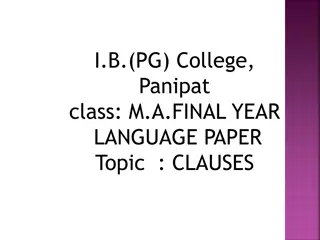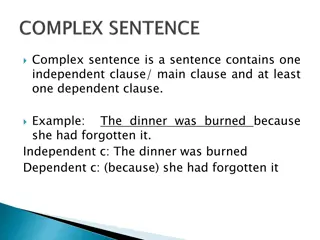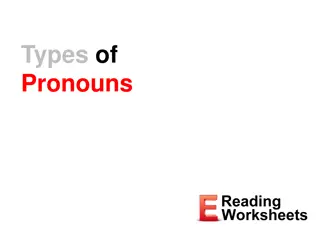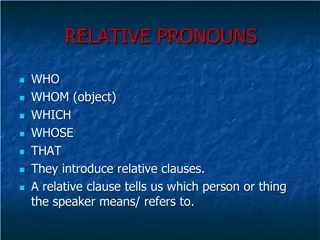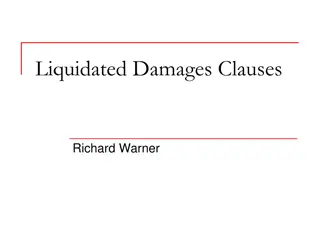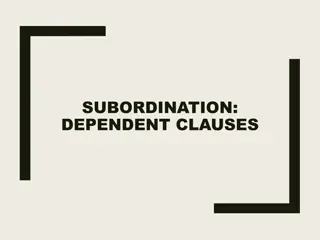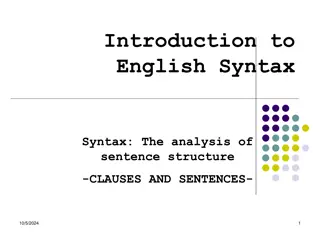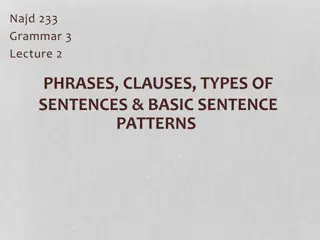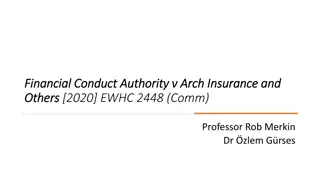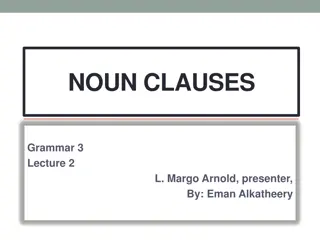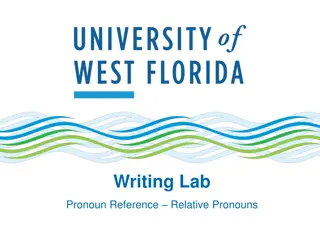Understanding Embedded Clauses in Writing
Explore the use of embedded clauses in writing through examples and practice exercises. Learn to identify main and subordinate clauses, conjunctions, and create sentences with fronted adverbials. Enhance your writing skills by understanding the structure and function of embedded clauses.
0 views • 12 slides
Understanding Phrases, Clauses, and Expressing Future in Time Clauses
Learn about the difference between phrases and clauses in sentences. Understand how clauses can be independent or dependent, and how time clauses are used to express future actions. Discover the rules around constructing time clauses and their significance in sentence structure.
5 views • 14 slides
Understanding Noun Clauses in English Grammar
A clause is a group of words with a subject and a verb, while a phrase lacks one. Independent clauses can stand alone, while dependent clauses cannot. Noun clauses function as nouns in a sentence, serving different roles like subjects, objects, prepositional objects, and complements. They can start
1 views • 49 slides
Understanding VSAM Logical Record Access Methods
VSAM utilizes three primary methods to find logical records - Relative Byte Address, Relative Record Number, and Key field. Relative Byte Address assigns a unique address to each record based on sequential ordering. Relative Record Number is used in RRDS datasets to access records by a numbered sequ
3 views • 35 slides
Understanding Top 5 FSS Clauses for Federal Supply Schedule Contracts
This training session delves into the crucial FSS contract clauses that impact compliance and management. Learn about key clauses like minimum contract sales criteria, cancellation authority, and trade agreements requirements. Discover how these clauses can affect offerors and contractors, guiding y
0 views • 39 slides
Understanding Motion: Frames of Reference and Relative Motion
Motion is defined as a change in position over time. To describe motion accurately, one needs to understand frames of reference and relative motion. Frames of reference are systems of objects used to determine if something is in motion, while relative motion involves movement in relation to a refere
3 views • 14 slides
Understanding Relative Pronouns in English Grammar
In this lesson, we delve into the concept of relative pronouns in English grammar. Relative pronouns like who, whom, which, and that are used to connect clauses or phrases to nouns or pronouns. Through examples and exercises, learners can practice identifying and using relative pronouns effectively
6 views • 8 slides
Crime Vocabulary and Grammar: Murder Mystery Exercises and Relative Clauses
Explore crime-related vocabulary like rob, steal, burgle, and murder in the context of a murder mystery story. Practice exercises on robbery, theft, and murder, then delve into relative clauses with examples and explanations. Enhance your understanding of crime terminology and grammar concepts.
1 views • 8 slides
Understanding Subordinating Clauses and Conjunctions through Examples
Explore the concept of subordinating clauses and conjunctions by analyzing sentences with conjunctions like "when", "after", "if", "once", and more. The examples showcase how these clauses connect dependent and independent clauses to enhance sentence structure and meaning. Gain insights on using sub
1 views • 6 slides
Understanding Adjective Clauses in English Grammar
Adjective clauses, also known as relative clauses, are dependent clauses that act as adjectives in sentences. They modify nouns, pronouns, or entire sentences and begin with a relative pronoun. This article explains how adjective clauses function, provides examples, and discusses the use of pronouns
1 views • 62 slides
Understanding Noun Clauses in English Grammar
A clause is a group of words with a subject and verb, while a phrase lacks one. Noun clauses, functioning as nouns, serve various roles in sentences. They can be subjects, objects of verbs/prepositions, or complements. Starting with question words like what, when, or why, these clauses mirror statem
0 views • 49 slides
Understanding Adverbial Clauses in English Grammar
Adverbial clauses in English grammar serve as adverbs to modify verbs, providing information about time, place, cause, contrast, condition, purpose, result, and manner. By exploring the types of adverb clauses, subordinating conjunctions, and examples, you can enhance your understanding of how adver
0 views • 10 slides
Understanding Adverb Clauses: Usage and Examples
Adverb clauses help to establish relationships between ideas by indicating time, cause and effect, contrast, and condition. They are dependent clauses that must be connected to a main clause. Punctuation plays a key role in distinguishing between adverb clauses that precede or follow a main clause.
0 views • 43 slides
Understanding Types of Clauses in English Grammar
A clause is a fundamental unit of a sentence, comprising a subject and predicate. Learning about the different types of clauses - Independent, Dependent, Relative, and Noun clauses - helps in enhancing grammar skills and sentence structure understanding. Independent clauses stand alone as complete s
2 views • 11 slides
Understanding Clauses and Their Types in English Grammar
This comprehensive guide explores different types of clauses in English grammar, including main clauses, subordinate clauses, independent clauses, adverb clauses, noun clauses, and adjective clauses. It delves into the functions of clauses as subjects, objects, complements of verbs, objects of prepo
2 views • 11 slides
Understanding Relative Velocity and Acceleration in Physics
Relative velocity is defined as the velocity of an object in the rest frame of another object, and it can be negative depending on the difference in velocities. The need for using relative velocity lies in determining if an object is at rest or moving. The formula for relative velocity involves the
1 views • 25 slides
Understanding Adverb Clauses: Types and Examples
Adverb clauses are dependent clauses that function as adverbs to modify the main clause's verb. They are connected by subordinating conjunctions and come in types like time, condition, cause, effect, and contrast. Adverb clauses of time detail when actions occur, while examples showcase how they mod
5 views • 7 slides
Understanding Adjective Clauses and Noun Clauses in English Grammar
Learn the key differences between adjective clauses and noun clauses in English grammar. Adjective clauses describe nouns, while noun clauses take the place of a noun in a sentence, serving as either the subject or object of a verb. Discover how to identify and use these clauses effectively through
0 views • 10 slides
Understanding Relative Clauses and Pronouns
Utilize relative clauses to provide additional information to a noun, using relative pronouns such as who, which, where, when, and whose. Learn how to construct complex sentences with at least two clauses, ensuring the subordinate clause complements the main clause. Explore examples and practical st
2 views • 14 slides
Impact of Climate Change on Winter Haze Pollution in Beijing: Role of Relative Humidity
Relative humidity plays a crucial role in the formation of winter haze pollution in Beijing. Studies show a high correlation between wintertime PM2.5 levels and variables like meridional wind velocity and relative humidity. However, the effect of climate change on Beijing haze in the 21st century is
0 views • 11 slides
Understanding Phrases, Clauses, and Sentence Structures in Grammar
Learn about phrases and clauses, differentiate between independent and dependent clauses, identify subordinate conjunctions, and practice annotating sentences for independent and dependent clauses. Improve your grammar knowledge with examples and guided practice exercises from Perry High School's Gr
2 views • 67 slides
Understanding Clauses of Purpose in English Grammar
Clauses of purpose in English grammar are used to explain the reason behind an action or event. They can be introduced in various ways such as full infinitive, in order to, so as to, so that, among others. These clauses serve the purpose of clarifying the intentions or outcomes of a particular actio
3 views • 11 slides
Understanding Grammar: Clauses in Sentences
A clause is a fundamental part of a sentence that comprises a subject and a verb. A clause can either stand alone as a sentence or be dependent on a main clause. Independent clauses can function independently, while dependent clauses rely on main clauses for context. Examples and explanations help c
0 views • 28 slides
Headless vs. Headed Relative Clauses in Latin: A Comparative Study
This study delves into the complexities of headless and headed relative clauses in Latin, exploring their syntax, semantics, and functions. Through analyzing examples from ancient texts, the research sheds light on the distinct characteristics and uses of these structures in the evolution of Latin g
0 views • 62 slides
Understanding Clauses in English Language
This informative presentation delves into the concept of clauses in the English language, covering topics such as types of clauses (independent, subordinate, noun), definitions, examples, and how to combine sentences using clauses. Exploring the basics and intricacies of clauses can enhance your und
0 views • 17 slides
Understanding Complex Sentences and Clauses
Complex sentences consist of an independent clause and at least one dependent clause, such as adjective, adverb, or noun clauses. They are connected using subordinate conjunctions, relative pronouns, and relative adverbs. Each has a specific role in modifying nouns, pronouns, verbs, adverbs, or conn
0 views • 14 slides
Understanding Different Types of Pronouns
Learn about the seven types of pronouns - Personal, Possessive, Reflexive, Relative, Demonstrative, Indefinite, Interrogative. Personal pronouns replace nouns, possessive pronouns replace possessive nouns, reflexive pronouns refer back to the subject, relative pronouns introduce relative clauses, an
0 views • 16 slides
Understanding Relative Pronouns in English
Relative pronouns such as who, whom, which, whose, and that are used to introduce relative clauses in English grammar, specifying which person or thing is being referred to. They play a crucial role in defining and non-defining relative clauses, providing essential information and connecting sentenc
0 views • 16 slides
Understanding Liquidated Damages Clauses in Contracts
Liquidated damages clauses serve to determine a precise amount of damages in case of contract breach when actual damages are difficult to ascertain. Courts enforce such clauses if they meet certain criteria based on reasonability and proportionality. Historical hostility towards these clauses has le
0 views • 17 slides
English Grammar Final Exam Review
Subordinate clauses, nominal phrases, and noun clauses are identified within the context of adjectival, adverbial, or nominal functions. The exercise covers recognizing nominal clauses following prepositions as noun phrases, pronouns, gerunds, or nominal clauses. Additionally, combining sentences us
0 views • 17 slides
Sharing Favorite Films and Relative Pronoun Practice
In this conversation, we discuss favorite films, focusing on "The History Boys," and invite you to share your favorite film with details like its title, why you like it, who stars in it, and what it's about. Additionally, there is a practice session on using relative pronouns in defining and non-def
0 views • 12 slides
Understanding Types of Sentences in English Grammar
Types of sentences in English grammar include clauses - independent and dependent. Independent clauses stand alone, expressing complete thoughts, while dependent clauses rely on independent clauses. Different types of sentences include simple, compound, complex, and compound/complex sentences. Simpl
0 views • 41 slides
Mastering Relative Clauses in Writing
Enhance your writing skills by mastering the use of relative clauses to draw inferences about characters' feelings, thoughts, and motives. Learn how to add extra information to sentences using relative clauses beginning with who, which, where, when, whose, that, or an omitted relative pronoun. Explo
0 views • 20 slides
Understanding Subordination in Grammar
Subordination in grammar involves dependent clauses that are not independent. These subordinate clauses play three main roles in a sentence: adverbial, adjectival, and nominal. Adverbial clauses provide information on time, manner, place, condition, reason, and purpose. Adjectival clauses act as mod
0 views • 26 slides
Understanding English Syntax: Clauses and Sentences Analysis
Delve into the major properties of clauses, including finite verbs, mood distinctions, and descriptions of situations and participants. Explore compound and complex sentences with main and subordinate clauses, along with complement clauses in English syntax analysis.
0 views • 27 slides
Understanding Phrases, Clauses, and Sentence Types in Grammar
A phrase is a group of words within a clause that conveys meaning, such as noun phrases, verb phrases, adjective phrases, adverbial phrases, and prepositional phrases. Clauses are groups of words containing a subject and a verb, with independent and dependent clauses being the two main types. Indepe
0 views • 33 slides
Analysis of FCA v. Arch Insurance Case: COVID-19 Impact on Insurance Policies
The case of Financial Conduct Authority v. Arch Insurance highlights the legal implications of COVID-19 on insurance policies, focusing on trigger of cover clauses, relevant background regulations, objectivity principle in contractual construction, trends clauses, and the counterfactual assessment.
0 views • 23 slides
Understanding Noun Clauses in Grammar
Noun clauses are dependent clauses that act as nouns in sentences, serving as subjects, verb objects, prepositional objects, and complements. They should not be separated from main clauses with punctuation. Noun clauses can appear at the beginning of a sentence or after certain nouns, adjectives, an
0 views • 77 slides
Mastering Relative Pronouns: A Comprehensive Guide
Dive into the world of relative pronouns with this comprehensive guide featuring explanations and examples of using who, whoever, whom, whomever, whose, which, that, and this. Explore how to choose the right relative pronoun for people, places, and things, and learn about their usage in restrictive
0 views • 5 slides
Understanding Relative Pronouns and Adjective Clauses in Literature
Explore the use of relative pronouns and adjective clauses in literary works by authors like Gary D. Schmidt and Jim Murphy. Learn the distinctions between "who," "whose," "whom," and "that" in referring to people and things. Practice identifying and creating examples of adjective clauses starting w
0 views • 10 slides

